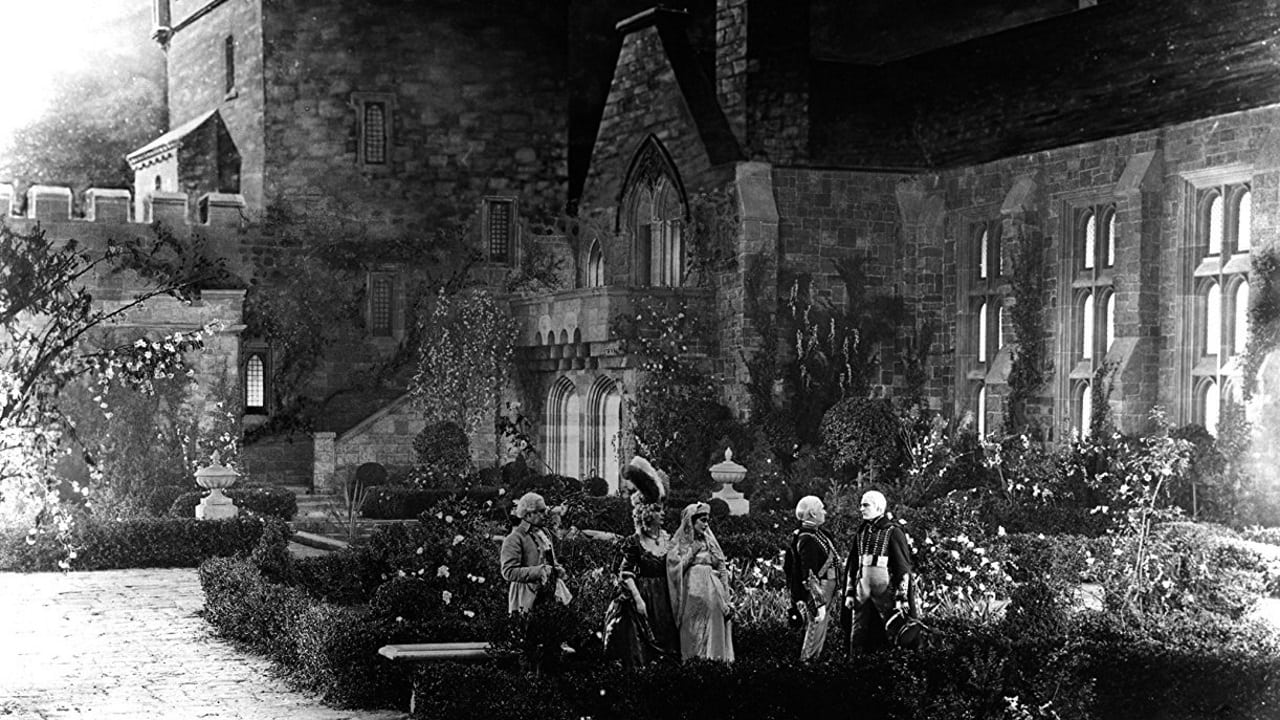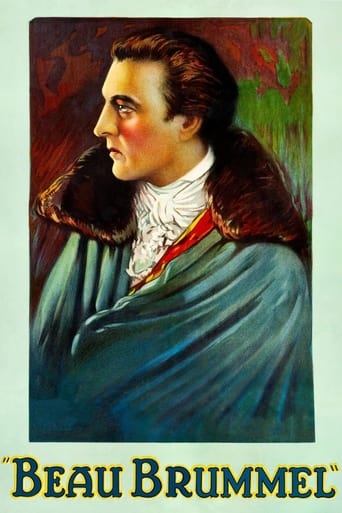

It's funny watching the elements come together in this complicated scam. On one hand, the set-up isn't quite as complex as it seems, but there's an easy sense of fun in every exchange.
... View MoreIt's a mild crowd pleaser for people who are exhausted by blockbusters.
... View MoreIt's an amazing and heartbreaking story.
... View MoreIt is a whirlwind of delight --- attractive actors, stunning couture, spectacular sets and outrageous parties.
... View More"Nowhere in all history can be found a more amazing character than George Bryan Brummel, the friend of Princes, the arbiter of fashion and the social ruler of England during the reign of George III. And nowhere in all fiction can be found more romance than was crowded into the life of this penniless commoner, whose natural charm and studied insolence made him the greatest dandy of all time - the immortal 'Beau' Brummel," asserts the this film's illustrative opening. And John Barrymore is well-suited for the leading role...We begin in 1795, when dapper officer Barrymore gathers with the greatest personages in England for a wedding. The bride is his beautiful young lover Mary Astor (as Margery). Unfortunately, the groom is not Barrymore. Pressured by family to dismiss her true love and submit to an arranged marriage, Ms. Astor weds foppishly fat Willard Louis because Barrymore is a poor commoner and Mr. Louis is a Prince in line to be King. For revenge, Barrymore decides to infiltrate British high society with scandal..."Beau Brummel" suffers from a threadbare plot, but boasts rich production values. Hollywood offered Barrymore greater access to life's pleasures and he returned the favor with moments of relentless overacting; considering the weaknesses in this story, it helps the film. Much admired, Barrymore won the Rudolph Valentino Medal as 1924's "Best Actor" for his "Beau Brummel" characterization. And the film went to the Top 5 in annual lists compiled by the New York Times, Film Daily, and Motion Picture Magazine.****** Beau Brummel (3/30/24) Harry Beaumont ~ John Barrymore, Mary Astor, Willard Louis, Alec B. Francis
... View MoreBeau Brummel (1924)*** (out of 4)Warner wanted to make a name for themselves so they went all out with this lavish production that features a terrific performance from John Barrymore. He plays the title character, a poor man who has the woman (Mary Astor) he loves taken away from him because of his low standing in society. Heart-broken, Beau sets out to use his charm and wit to get back at the society who ruined his life. Have you ever watched a big-budget movie and wonder where all the money went to as it's obviously not showing on screen? Well, that's certainly not the case here as one can't help but be impressed with the magnitude of this film. The sets, costumes and production values are all extremely high and this helps keep the film moving even when the story isn't doing much. I think the biggest flaw with the movie is its 128-minute running time, which leads to some dead space here and there. The story itself isn't all that ground-breaking even for this era so I'm guessing the main reason for the longer running time was just to give the film a more "epic" feel. With that said, this is still a very impressive movie. As I said earlier, the massive sets are extremely impressive and one can't help but get caught up in their sheer beauty. The images of the costumes alone makes one really focus in. Just take a look at a sequence towards the end when a large number of soldiers are marching. One does wonder what all these extras in these lavish costumes cost the studio. Those familiar with Astor are probably more aware of her sound films so seeing her here, at 18-years-old, was a pretty big eye-opener just because I wasn't use to see her look so young. She is pretty good in the role and handles working next to Barrymore and never gets tramped by him. Willard Louis is extremely good as the Prince of Wales who is the one Beau really goes after in the film. Carmel Myers, Richard Tucker and William Humphrey turn in fine work as well. Alec B. Francis plays the long-time servant and is wonderful. As for Barrymore, he's pure magic here. A lot of people are going to call the performance hammy or stage-bound, which might be fair but from all the movies I've seen of his this one here gave the closest feel of what it might have been like watching him on the stage. He really nails every inch of this character whether it's the poor boy at the start, the rich jerk or the eventual fallen and broken man. Barrymore is clearly having a great time playing all of these different styles and he's especially effective in the final scenes, which I won't spoil. The scene can be called melodrama but it's melodrama at its highest peak thanks to Barrymore. He alone makes this film worth checking out.
... View MoreBEAU BRUMMEL (A Warner Brothers Classic of the Screen, 1924), directed by Harry Beaumont, from the play and historical data by Clyde Finch, stars the legendary John Barrymore in one of his most prestigious films of the silent era. Mixing fact and fiction into the life of George Bryan Brummell (1778-1840), an English social arbiter, the opening inter-title sums it up best: "Nowhere in all history can be found a more amazing character than George Bryan Brummel, the friend of princes, the arbiter of fashion and the social ruler of England during the reign of George II. And nowhere in all fiction can be found more romance than was crowded into the life of this penniless commoner, whose natural charm and studied insolence made him the greatest dandy of all time - the immortal Beau Brummel." For the plot summary, beginning in the year 1795, George Bryan Brummel (John Barrymore), British Army officer and captain of the Tenth Hussars, deeply loves Margery Werthaim (Mary Astor). Because her mother (Clarissa Selwynne), "ambitious, relentless," finds Brummel to be a young man of no importance, insists Marjory wed Lord Alvanloy (William Humphrey) instead. As she takes her daughter to get married, Alvanloy leaves Brummel in the garden in humiliation by throwing him a sixpence. Next scene: "Revenge was all he thought of now. He would use his charmed wit and personal appearance in a game against the society which has robbed him of his love." For the years to follow, Brummel does just that. Through the guidance of the Prince of Wales (Willard Louis), Brummel makes his way through society, resigns from the Army, abandons his whig for a more natural hair, has an affair with Mrs. Snodgrass (Betty Brice), the landlord's (James Marcus), wife; and makes his indiscretions with the ladies of the court, particularly Lady Hester (Carmel Myers), wife of Lord Henry Stanhope (Richard Tucker), whom he finds terribly annoying; and Frederica Charlotte (Irene Rich), sister-in-law of the Prince of Wales, whom he claims to be a tender woman, all of whom he loves and leaves. Making many enemies and finding himself heavily in debt, he at first serves time in a jail in Calais, and later finds himself living in poverty. His only true friend during his declining years is his servant, Mortimer (Alec B. Francis), whom he dismisses from his employ for being too helpful. Falling out of love with everything, Brummel is approached by Marjory, only to lose her again as explained with these words: "Death kills but once, life kills many times." What further develops remains to be seen. At first glance, BEAU BRUMMEL comes across as an overlong (128 minutes) dull costume drama about doomed love (with portions closely resembling George Du Maurier's PETER IBBETSON), redeemed by sincere yet "ham" acting of John Barrymore, from a young dandy to aged old man (with a striking resemblance to the older appearance of his brother, Lionel), and the ever youthful Mary Astor, both of whom would be reunited in DON JUAN (Warners, 1926), and supporting Claudette Colbert in the sound comedy, MIDNIGHT (Paramount, 1939). Looking over and comprehending everything not absorbed the first time around, this can now classified as a rich atmospheric production with fine acting, by 1920s standards, and detailed period pieces of long, long ago. Although there's really no action involving sword play to stir up excitement, there's little suspense midway involving a duel a Bowling Green between Brummel and a jealous husband.BEAU BRUMMEL, a fortunate survivor of the silent film era, is not as relatively known as others from that era. In the wake of home video, however, it was placed on video cassette during the late 1980s through various distributors, including Video Yesteryear and Grapevine Video, just to name a few, mostly with missing footage and poor quality visuals. It can also be acquired in the DVD format as well.Cable television's Turner Classic Movies brought BEAU BRUMMEL back to life by having a restored copy for its January 29, 2008 presentation accompanied by new and exceptional orchestral score conducted by young film composer James Schafer of Rancho Cucamonga, California. Regardless of host Bob Osborne announcing BEAU BRUMMEL making its "world television premiere," in fact, has played on television before in April 1994 on the Nostalgia Channel as part of its Saturday night weekly presentation of "When Silents Were Golden." Aside from an already pre-recorded orchestral score from a 1930s reissue used for this feature, watching BEAU BRUMMEL or any silent movie for that matter, couldn't really be fully appreciated on the Nostalgia Channel due to its frequent commercial interruptions. Now that it has finally turned up on the commercial free TCM, BEAU BRUMMEL may have its chance of rediscovery to the delight of film enthusiasts wanting to compare this with its 1954 remake (with Brummel ending with two L's) starring Stewart Granger, Elizabeth Taylor and Peter Ustinov. (***)
... View MoreWhat can anyone say about this? Beautiful print, some fine acting by Barrymore -- wonderfully subtle for the period in the early sequences and quite appropriately over-the-top at the end. Given the uniformly over-the-top performances he was called on to make towards the end of his career, the well-preserved Barrymore silents -- this one, his fine, generous performance in THE BELOVED ROGUE, and the sheer electricity between him and Dolores Costello in WHEN A MAN LOVES show what a fine actor he is -- those turns and his wonderful comic work in MIDNIGHT.I have been less than impressed in the past by some of the scores offered by the Young Composers but, although a bit shaky in the earlier sequences, this one settled right down and was quite good.I had quite forgotten this was directed by Harry Beaumont, who became my favorite MGM B director -- even though, of course, MGM didn't make B movies.
... View More